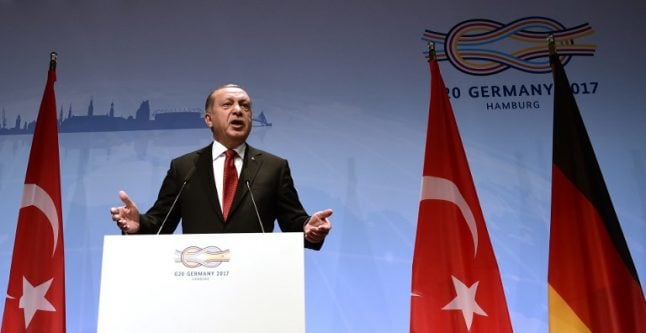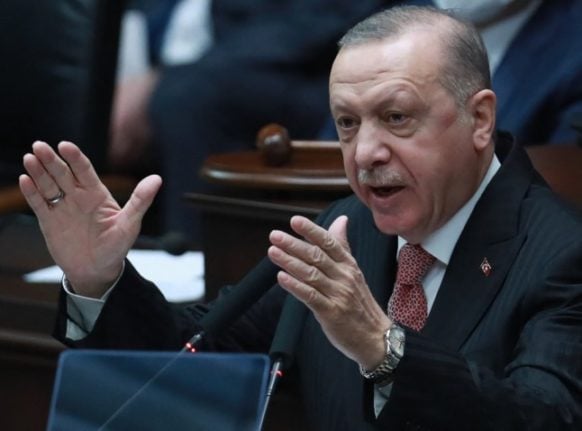TURKEY
EU backs Germany’s tough stance on Turkey
Germany's tough stance on fraying relations with Turkey is "understandable," not least given Ankara's detention of human rights activists including German nationals, EU Commissioner for Enlargement Johannes Hahn said in an interview published on Saturday.
Published: 22 July 2017 14:24 CEST

Turkey's President Recep Tayyip Erdogan at the G20 Summit in Hamburg earlier this month. PHOTO: TOBIAS SCHWARZ / AFP
“I think we have shown great patience with Turkey. It seems not to appreciate that. The reaction of Germany is understandable,” Hahn told German daily Die Welt.
German Foreign Minister Sigmar Gabriel on Thursday issued an unusually hard-hitting statement in which he warned German firms against investment in Turkey and spoke of an “overhaul” of the country's entire relationship.
Already furious over the February jailing of Deniz Yucel, Turkey correspondent for Die Welt newspaper, Berlin has been further aggrieved by the order of a Turkish court earlier this month to remand in custody six human rights activists detained on an island off Istanbul.
The six include Amnesty International's Turkey director Idil Eser and Berlin-based activist Peter Steudtner.
Nine Germans — four of whom also have Turkish nationality — are currently in Turkish detention and Hahn regretted that Ankara “is moving further and further away from European standards” with its crackdown on government opponents since last year's failed coup.
“The most recent arrests of human rights campaigners sadly confirms the destructive course Turkey has taken since the coup attempt, which we have firmly condemned,” said Hahn.
The fraying relationship between the two Nato partners has only served further to stymie moves to bring Turkey into the EU fold, with membership negotiations moribund.
European Commission President Jean-Claude Juncker last weekend told German mass daily Bild that “Europe's hand remains extended” towards Ankara.
But Juncker stressed Turkey had to show “clearly its desire to be European and consciously take on board fundamental European values.”
Turkish President Recep Tayyip Erdogan waded into the breach on Friday by saying in a speech that Berlin could not intimidate his country or “scare us with these threats.”
After Thursday's uncompromising statement, Gabriel on Saturday struck a more conciliatory tone, describing the friendship between the two countries as a “great treasure” in a Bild article in German and Turkish.
Insisting Berlin had no quarrel with the three-million strong Turkish community in Germany, Gabriel stressed that “the German government cannot look on and do nothing when German citizens are arrested.”
Url copied to clipboard!


 Please whitelist us to continue reading.
Please whitelist us to continue reading.